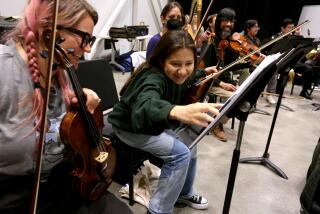In Search of the Soul of the Trombonist
- Share via
LAS VEGAS — It seems too much to take in all at once--dozens of trombone players lined up. Only trombone players. The sight of all that heavy metal stops you.
What strikes you right off is the vibrating air--the whole room resonates. It’s not loud, not brassy, but something that surrounds, what it must feel like to be dipped into warmed chocolate.
OK, writers occasionally take you to some odd places in pursuit of What Makes People Tick. But the idea of 500 trombonists converging here for the International Trombone Workshop last week was too tempting to pass.
Of course, I have a bias. My non-Times life is as a trombone player. So this was an assignment from heaven, a chance to mingle with people who share the eccentric view that most of the population was placed here to hear from the few of us who play slide trombone.
Now, 500 of anything in one place could be interesting. But 500 trombones . . . now that’s really interesting.
“They’re not viola players,” explained one trombonist. “You wouldn’t get them confused. They’re not finicky.”
There are more of us out there than you may think. A call to the University of Nevada, Las Vegas, host of the workshop, turned up the news that organizer Ken Hanlon in the provost’s office is a trombonist; a secretary said she had known that fact.
“Even if he didn’t talk about it all the time, you’d know. He has passion about it. He has the soul of a trombonist.”
I knew we were onto something important here--unearthing Southern California’s trombone subculture.
Question: What is the definition of an optimist? Answer: A trombone player with a beeper. You imagine a gathering of 500 trombone players in Vegas will be, well, something like 500 Elvis impersonators getting together.
It was oddball enough for the local television weather reporter to do the evening stand-up before an impromptu gathering of about 100 trombones. And the university dining hall was turned into a lunch-hour concert facility.
Actually, the workshop was an extended oasis with some of the best players in the world, a celebration for the trombone-starved--recitals, concerts, teaching clinics and lots of music. Said Marty Williams of Santa Ana: “It’s Disneyland for trombone players.”
Indeed, it was a most eclectic mix of people and music styles, from jazz to avant-garde, symphonic presentations to the cacophony of instant hallway duets. The pros mixed with the academics, the hot students met up with retirees who finally have enough time for trombone in their lives. And Greg Ingalls from Michigan, finishing trombone studies at Oberlin, was here for what became a successful audition for a job--with a small orchestra in Germany.
Among the non-professionals, this was like going to that baseball fantasy camp, mixing with the stars. “It does leave you with a bittersweet feeling, though,” said Dr. Norm Buckley, an anesthesiologist from Hamilton, Canada. “These players are so good, you don’t know whether you want to just put the horn away.”
Not all was sweetness and light: People worried about jobs, about getting paid for playing, about evening the opportunities for women, about the declining support for the arts.
And they worried that among the musical instruments, the trombone gets no respect.
Jan Kagarice of Denton, Tex., whose all-woman quartet PRISMA drew plaudits, explained, “We are artists just as violinists are artists. People would probably laugh to think of having a trombone quartet for the tea instead of a string quartet. . . . But we have so many more colors in our sound.”
Organizer Hanlon, who teaches music theory, said UNLV has been host to a 76 Trombones group each fall. “People seem amazed to see that many trombones at one time. Then they seem amazed at the kind of sound it produces.”
While players of other instruments have similar gatherings, “this one is different,” said Steve Wolfinbarger, teacher of trombone at Western Michigan University and president of the sponsoring International Trombone Assn. “People aren’t showing off. They like being with each other.”
There is a similar gathering for viola players, he said, “but I wouldn’t want to be there.”
The main problem is image.
“Most people probably can’t name a living trombonist,” Wolfinbarger said. In all, there are a few hundred professional jobs in the country among symphonies and military bands. Even professionals must supplement their wages by teaching, clinics and campus visits.
“Orchestra management seems to think that soloists are only pianists or violinists, or an occasional baroque flute,” said a teacher. “There are probably only about two people making a living as soloists, and probably just barely.”
At the workshop, there was news: Seven newly commissioned pieces were performed, including four trombone concerti underwritten by a single Nevada doctor. A commission for a jazz work by L.A. band leader Bill Holman featured four name trombonists (Bill Watrous, Carl Fontana, Ian McDougall and Jiggs Whigham) playing together for the first time. The Los Angeles Philharmonic low brass--Ralph Sauer, Herbert (Sonny) Ausman, Jeff Reynolds and Norm Pearson--gave one of several clinics, this one showing the dynamics of sectional orchestral work.
There were tensions: Organizers showcased women’s groups and performers. A longtime hiring discrimination battle waged by Abbie Conant, principal trombonist for the Munich Symphony, to get and keep her job has sparked efforts to draw more women to the trombone, and more notice that women have trouble getting hired.
There was playing: Groups were organized at the pffst of a spit valve. The women formed a trombone choir. The professors played together. I went with the Weekend Warriors, the organized path for the non-professional musicians. Jazz star Whigham was featured in front of our 48 trombones on stage. Playing quietly was encouraged.
And there was humor. Lots of humor.
Q: What does a trombonist ask when he gets to his job? A: Would you like fries with that, sir? “The soul of a trombone player”?
What could that have meant?
Trombonists “are generally nice people. They don’t show off. They are, well, different from, say, trumpet players,” explained a musician from the Midwest. “Trumpet players just tell you right off they are better than you. Trombonists actually share knowledge.”
“Trombonists have a cynical sense of humor. Of course, they have to, to get through the day or to try to make a living,” said a Las Vegas musician.
Said Hanlon: “We had a gathering of oboists and bassoonists here a couple of years ago. I can tell you there is a difference. But that would be instrument chauvinism.
“Within the orchestra, the trombone players tell the best jokes. It’s probably because they spend the most time counting measures, waiting to play.”
Kagarice said, “You have to have a sense of humor to be a trombone player.” She is married to another trombone player.
McDougall deadpanned, “My father, who was a banjo player, told me to play the trombone because a good trombone player is never out of work.”
That line got the biggest laughs of the week.
Q: How do you make a trombone sound like a French horn? A: Stick your hand in the bell and play some wrong notes. Of course, there are no Census numbers for trombonists in Southern California, but there are probably a couple hundred. The studios draw on a core of them, colleges account for others, and then there are the scores of amateurs and free-lancers who have other jobs but feel a need to play.
The region was well represented by musicians from the Los Angeles Philharmonic, several jazz players and the Moravian Trombone Choir of Downey.
Just the idea of a trombone choir is enough to surprise most folks. Trombones varying in size from a relatively tiny soprano trombone--what director Rob Smit calls an “oversized paper clip”--to alto trombones, the more familiar tenor trombones, bass trombones and a contrabass trombone blend in a unique, organ-like sound.
I was among the 20 trombones in the Moravian group, most of whom drove to Las Vegas just to perform before other trombone players. Smit manages a hotel in Whittier. Members include a bank employee, a music librarian, an aerospace engineer, a newsletter publisher; some are from the Moravian Church congregation, a Protestant tradition that has adopted the trombone for 300 years, with quartets often substituting for organ.
The music is a mixture of hymns, fanfares, transcriptions and compositions just for this choir.
“It’s a sound you hear nowhere else,” one musician said. “It is like the blending of human voices. Most groups that have trombones have a different coloring--brighter.”
Don’t look at the trombones. It will just encourage them. --Richard Strauss (from a trombone discussion group on the Internet) For sure, the trombone is a subject of endless ribbing and cartooning. Its very shape and slide lend themselves to spoofing.
Los Angeles-based jazzman Bill Watrous told of the Inglewood music store that was looted. “Once they found out what they were, they returned all of the trombones,” he quipped.
The Internet has a trombone discussion group (trombone-l@mail.missouri.edu) and the Trombone Web Page (https:www.missouri.edu/~cceric/index.html)
Opportunities to play trombone around Southern California abound. Opportunities to get paid for playing lag, and that, too, is a constant source of concern and, inevitably, of black humor.
It is not difficult to play every night of the week. In addition to the trombone choir, I play regularly, for example, with a jazz sextet, a brass quintet featuring chamber music, big bands, a trombone quartet, and occasionally with a Dixieland group and community orchestras. Of course, I have a day job, though it can annoy my boss, the editor of The Times, when I tell him I’m leaving to moonlight.
Trombone is not an easy instrument to play. The slide positions are inexact; the sound can be affected by the weather, the room, the temperature or even diet. Playing well seems to require a simultaneous balancing of skills, mental agility, flexibility and sensitive hearing for intonation.
“A lot of trombonists will turn to conducting or arranging. It is more lucrative,” explained one professional player.
“Or they work at another job.”
More to Read
The biggest entertainment stories
Get our big stories about Hollywood, film, television, music, arts, culture and more right in your inbox as soon as they publish.
You may occasionally receive promotional content from the Los Angeles Times.










